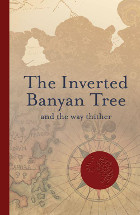The inverted banyan tree, and the way thither by J.K. Asher

Atlantis Books, 2017. ISBN 9781925117950
(Age: Adult) Recommended. Shifting scenes of 1944 Japanese occupied
Malaya, British colonial Malaya of the 1950s, and then "Visit
Malaysia 1985", present a twisting story of tiger hunts, murder,
ritual ceremonies, spirit guides, war crimes, love relationships,
extremist terrorism, life and death. Although at times confusing, a
picture is gradually built up of the complex relationships of the
British, Portuguese, Japanese, Hindu Indian, Chinese, and indigenous
Malay peoples that are woven together in a story that reveals the
hopes, beliefs, love, pain and suffering of them all. At the heart
of it is a story that is in many ways prescient of the present day
turmoil of fundamentalist terrorist hijacking of Muslim religion,
fuelled by Western imperialism. It is sobering to think that we do
not seem to learn anything from history.
The protagonist, Alistair, is British, slightly resentful that he
has not achieved the status and success of fellow traveller to
Malaysia, the businessman Ashman. Alistair meets and falls in love
with Ivy, a Serani or Eurasian, and befriends Dom, another Serani,
torn between Muslim and Christian, seeking guidance from the Spirit
Guide. Clearly Alistair is sensitive and understanding of the
nuances of relationships between the different cultural groups, but
is caught in the bureaucracy of the duties assigned to him by his
British superiors, intent on carving up the sacred Tiger Sanctuary.
That oblivious sense of superiority on the part of the colonisers is
what leads to the hostage and suicide plan of the extremist, Jihad,
member of the Al-Sijjin sect.
There are many other threads to this story: the unerring love
between Ismael and his teenage saviour Mariam; the haunted Japanese
war criminal seeking reparation by returning stolen artefacts; the
gifted student Isa cut down by ritualistic murderers; spiritualist
Ummah seeking the best solution for his people; and so many more,
that on finishing the book, I just wanted to start it all over again
to better understand and appreciate all the relationships.
This is a complex book that explores relationships between cultures,
just as the banyan tree creates intertwined trunks, roots, and
branches; it is deserving of more than one reading.
Helen Eddy